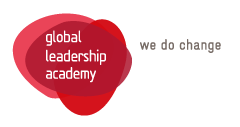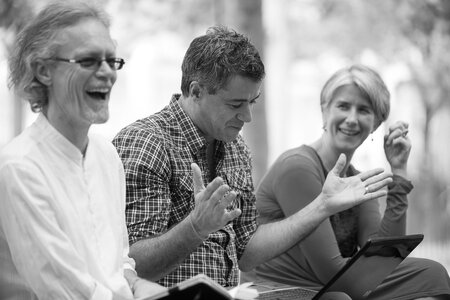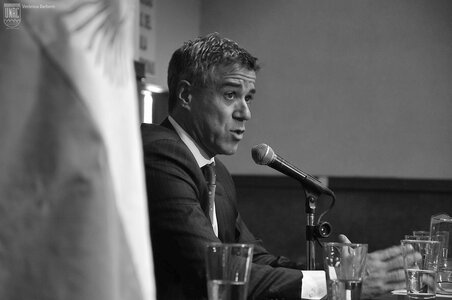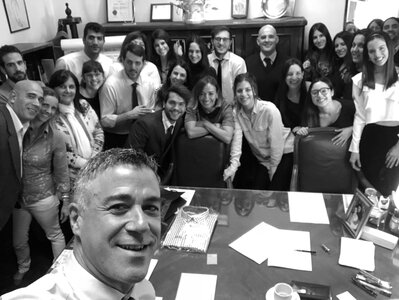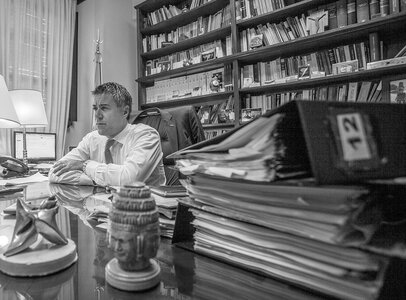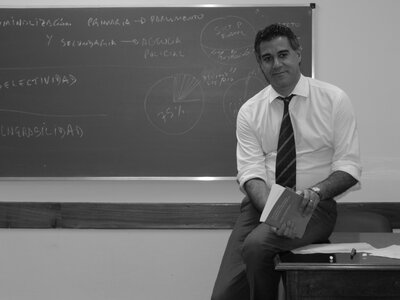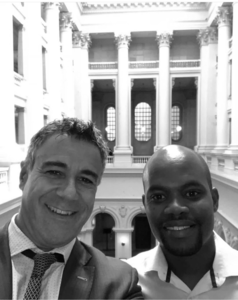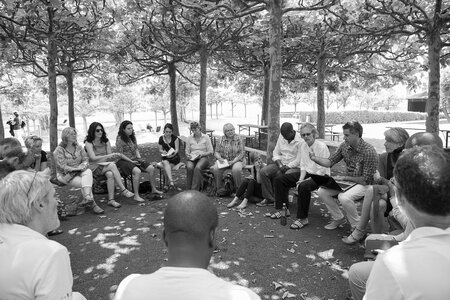The Sound of understanding
Daniel Eduardo Rafecas is a Federal Judge of Argentina, professor for Criminal Law and member of several organizations like e.g. the academic council of the Holocaust Museum in Buenos Aires. He took part in the Mandela Dialogues on Memory Work 1.
Being with a group of kindred spirits is not often part of Daniel’s daily business. In fact, as a Federal Judge, he often has to make lonely decisions. He is, among others, responsible for the trials that bring to justice crimes against humanity committed during the Argentine military dictatorship. One of the most sensational cases in Daniel’s career is the “First Army Corps Case” (Primer Cuerpo del Ejército), in which a large number of high-ranking suspects are prosecuted. Still working on that file, Federal Judge Daniel Rafecas has already sent to trial almost 300 perpetrators and provided reparation and judicial recognition to almost 3000 victims. He also identified 50 clandestine centers of kidnapping and torture, among other achievements.
A new idea of friendship
Participating in the Mandela Dialogues helped Daniel to review his accomplishments from a new perspective. The discussions with the other members opened his eyes not only to the efforts and endeavors of his peers, but also to the way his own work is affected by the situation in his country and how it in turn affects himself. The appreciation he experienced still resonates when he talks about the Lab.
Daniel is convinced that the harmonious choice of participants was the key to success for the Mandela Dialogues. Members of the Lab are still permanently in contact, sharing stories, encouraging each other and keeping alive the feeling of togetherness they discovered during their meetings. It is therefore not surprising that Daniel cherishes the experience of the Lab as enlightening and assigns it a special place in his long-standing career as man of the law and human rights activist.
In a moving letter, Daniel expresses his strong emotions:
»Mandela Dialogues. My experience.«
by Daniel Rafecas
During 2013 and 2014, I participated in the Mandela Dialogues, co-sponsored by GIZ and The Nelson Mandela Foundation (NMF). Three meetings took place, in Johannesburg, Pnomh Penh and Berlin. By far, this experience was the most enlightening and strong, throughout all my years as Federal Judge, as a jurist and as a human rights activist.
The first thing that I must emphasize regards the selection process of peers who were invited to join the group. This scouting, made by the two organizations (GIZ and NMF) set the performance of the whole group all along the three meetings. This was a key issue in order to explain the incredible success of these particular Dialogues, beyond all previous estimation. Indeed, both institutions made an outstanding, professional work, gathering people from all across the world that nevertheless were being deeply connected from the very first moment, a connection that remains strong until today, also including GIZ and NMF guests and the facilitators.
In my case, when I started to know more about the personal backgrounds of my MD peers, especially those coming from Cambodia, Kenia and South Africa, I was very shocked, because then I realized that, despite the different contexts, holding human rights and pursuing values like truth, justice and reparations for victims of massive crimes, isn't for free. On the contrary, it takes risks, and often means persecution and harassment.
In these deep and honest dialogues, not only individually but also as a group, I finally realized the solitude in which I deploy my work in my country, and knew that the vulnerability in maintaining our firm positions in our countries is the rule. That’s why a strong current of sympathy and solidarity came up in the group from the beginning, and remains alive until today.
I like to say that MD allowed me to discover that in my daily work in Argentina (and Latin America) trying to consolidate human rights, I feel like this lonely musician, who finally discovers, beyond all boundaries, that he belongs to a wider scenery, the group of MD, that worked (and still works) as an orchestra. Never before I felt the sense of belonging to a group of comrades, freedom fighters, like with my MD group.
Moreover, the threads who link all MD members remain untouched today, and were consolidated not only thanks to the three MD former meetings (2013 – 2014), but also because of the two additional meetings, in Sarajevo (2015) and in Edmonton (2017), and also because MD members are permanently in contact, sharing hopes and fears regarding our activities. Invitations between MD members are also another way to strengthen the relationships, for example, the invitations to come to Argentina, extended to Verne Harris (2015) and Mirsad Tokača (2016) shows clearly the continuity of contacts. Also I met another member of the MD, Mbongiseni Buthelezi in Buenos Aires in March 2018 and I’m in permanent contact with the another Argentinean and Uruguayan MD peers, María Cristina, Mariana Tello, Isabel Yschebor y Ariela Peralta. Finally, I was invited to Johannesburg in 2015 and to Germany in 2017 with the same spirit, keeping the flame alive.
I could say that the sowing (made with a lot of effort and professionalism by GIZ and MDF, and also by the facilitators of the dialogues), triggered an incredible and unexpected harvest, in terms of personal enrichment of all who were involved in the experience, in terms of seeking solidarity, in terms of friendship beyond nationalities and countries’ developments, in terms of forming a group of peers permanently connected, in terms of growing and trying to be better human beings, better professionals, better activists.
“I like to say that MD allowed me to discover that in my daily work (…) I feel like this lonely musician, who finally discovers (…) that he belongs to a wider scenery, the group of MD, that worked (and still works) as an orchestra. Never before I felt the sense of belonging to a group of comrades, freedom fighters, like with my MD group.”
Daniel Rafecas
Contributing to the Global Goals

